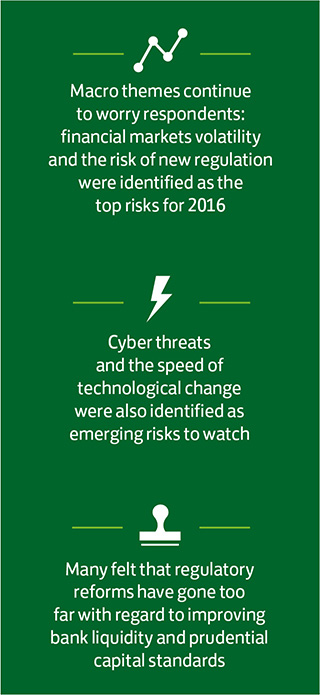As one of the most open economies in the world and home to a leading global financial centre, the UK is not immune to economic slowdown and shocks.
To make sense of the ever-uncertain environment and understand better the general tone of the UK market, Lloyds Bank launched its inaugural Financial Institutions Sentiment Survey, to assess the trends that will continue to define this challenging year. The survey is particularly timely, with the upcoming EU referendum impacting general UK economic and investment sentiment.
UK strength
Despite challenging market conditions, survey respondents were optimistic about the UK’s economic growth prospects, with 78% believing the UK would grow in line with, or faster than, other G7 economies in the coming year. Further evidence for this optimism came from the 35% of financial institutions that expect to expand UK operations, in particular their front offices, over the next three years.
However, optimism has declined during the previous 12 months with 42% saying they had become less optimistic and only 3% more positive than last year – meaning a net negative 39% outlook. Many leaders cited financial market volatility, new regulation and the upcoming EU referendum as causes for concern.
At the time of the survey, now several weeks ago, 79% of respondents expected the UK to remain in the EU, citing access to EU markets and barriers to trade as the major impacts of a vote to leave the EU. If the UK were to vote to leave, 62% indicated that they would not consider relocating a significant proportion of their business, with 13% indicating that they would.
Regulatory balance
Although the EU referendum is a prominent near-term concern for respondents, the growing influence of regulation also continues to impact financial institutions’ business models and strategies. The survey shows that businesses have responded positively to the effect new regulation has had in improving transparency, financial stability and consumer protection. There is still a balance to be struck however, with half of businesses believing regulation has had an adverse impact on economic growth.
This is reinforced by more than 30% of respondents saying they believe that elements of bank liquidity and capital reforms have gone too far. During the remainder of 2016, all parties should be mindful that the financial system is entering a new phase of its evolution. As an industry, we should allow time to reflect on the cumulative impacts of these reforms as markets digest them – and some latitude to tweak the framework where necessary.
FinTech future
The emergence of a leading UK FinTech industry, centred in London, demonstrates how the UK nurtures its innovative and agile culture. While the advent of FinTech can be viewed as a threat to established financial institutions, it also presents great opportunities for the industry, with 56% of business leaders agreeing or strongly agreeing that technology is the biggest driver of strategic change.
The UK as a whole remains a hospitable environment for competitive ventures and is a preferred market to test propositions, either in direct competition with or in partnership with established players. At present, legislation is keeping up with the wave of innovation, but with more and more FinTech firms making the UK their home, regulation will be needed to protect consumers’ and corporates’ data, identities and financial well-being whilst ensuring that technological development can still flourish.
Overall, the UK remains a strong financial centre and provides opportunities for growth and investment in the face of difficult market conditions.
In summary
In the face of global market volatility and the upcoming EU referendum, confidence in the UK economy has remained strong within financial services. Built on the foundation of a capable workforce and strong financial heritage, the financial services sector has remained robust, with the opportunity for front office expansion, regional growth and technological advancement leading strategic themes for many in the coming year.
However, there is still work to be done. The anticipation of the EU referendum has caused UK investment uncertainty and lowered economic optimism. Regulation continues to divide opinion, with capital and liquidity reform in particular being areas of potential concern. It is imperative that we, as an industry, leave space to review the impacts of the new regulatory framework during this important phase of regulatory implementation. Working with regulatory policy makers to strike a balance will be key to ensuring the long term success of the UK as a leading financial centre.
To read the full report visit:
lloydsbank.com/sentiment-survey









